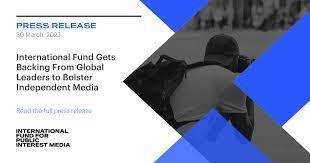
https://ifpim.org/resources/international-fund-gets-backing-from-global-...
Contributors range from the US, France, Switzerland, Sweden, Estonia, New Zealand, Denmark, and Taiwan, to the National Endowment for Democracy, the Ford Foundation, Craig Newmark Philanthropies, Luminate, MacArthur Foundation, Microsoft, and Google.
During the convening of world leaders at the first Summit for Democracy in 2021, U.S. President Joe Biden endorsed the International Fund, which was then in its nascent phase, founded in response to the growing and often existential funding crisis facing public interest media around the world. USAID committed $20 million in critical seed capital to support IFPIM’s scale-up and launch. Since then, the International Fund has grown rapidly, gaining the backing of a broad coalition of global leaders, including UN Secretary-General António Guterres, former President of Ghana John Kufuor, and former Prime Minister of New Zealand Jacinda Ardern. IFPIM has been endorsed by a number of active heads of state, including French President Emmanuel Macron, whose administration pledged support of the International Fund with an initial financial commitment of up to €15 million EUR and an agreement to host IFPIM’s headquarters in Paris as a quasi-International Organization, announced at the Paris Peace Forum in November 2022.
“This multilateral coalition to support the fourth estate embodies the vital defense of democracy that is necessary right now,” said Nishant Lalwani, CEO. “IFPIM has the backing of a diverse set of governments, corporates, and philanthropies as we strengthen our mission to shift public interest media to a new, more resilient paradigm.”
Inaugural Open Call
Given the urgency of the crisis faced by many media organizations, IFPIM began immediately deploying financial resources through its inaugural open call for grant proposals, announced at World Press Freedom Day in May 2022.
Following an extensive review of proposals, the International Fund selected 10 outlets and one multi stakeholder coalition for grant funding. This inaugural cohort of grantees, representing diverse business models and perspectives, is spread across IFPIM’s focus regions: Africa and the Middle East, Asia and the Pacific, Latin America and the Caribbean, and Eastern Europe. More details about IFPIM’s first group of grantees can be found on www.ifpim.org and also on page 15 of the International Fund’s 2022 annual report.
About the International Fund for Public Interest Media
The International Fund is a new, independent, multilateral initiative that responds to the existential threats facing public interest media in low- and middle-income countries. IFPIM is designed to urgently ramp up financial support to independent media organizations in crisis and accelerate long-term, systemic solutions to help media markets work for democracy.
IFPIM is a fiscally sponsored project of Rockefeller Philanthropy Advisors (RPA). RPA’s mission is to “accelerate philanthropy in pursuit of a just world by providing deep global expertise to make philanthropy more thoughtful, equitable and effective.”
Next Steps
In a few short weeks, as part of World Press Freedom Day on May 2nd, the International Fund will share news about its next steps. Updates will include an overview of the International Fund’s first phase of operations, including strategic funding priorities and focus countries.
The International Fund aims to galvanize additional support and calls on government and corporate leaders to mobilize further resources to support IFPIM’s mission of safeguarding public interest media. With additional funding, IFPIM will scale the level of support it can provide and grow the set of geographies in which this impact is delivered.










Add new comment